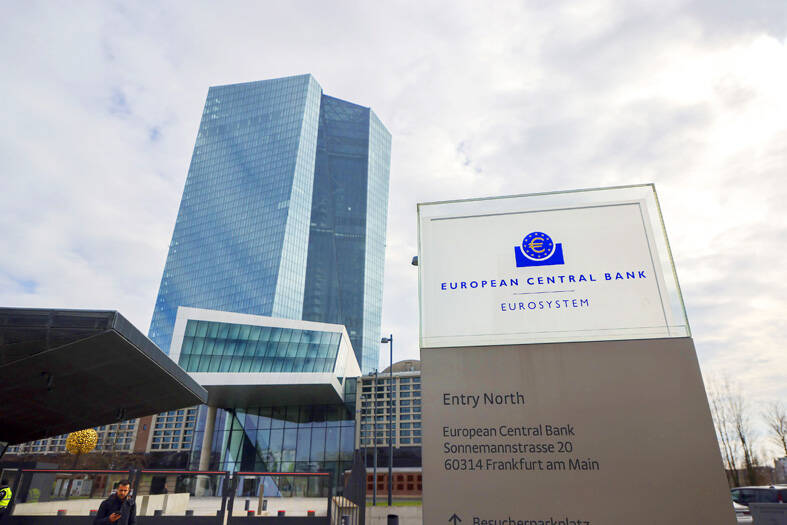European Central Bank (ECB) Vice President Luis de Guindos said the banking sector is “going through a period of very high uncertainty” that dictates a meeting-by-meeting approach on interest rate policy with no pre-commitment to a specific action.
“We are open-minded with respect to the future,” the Spanish banker said in an interview with Business Post posted on the ECB’s Web site yesterday.
“The question now is how the events in the US banking system and Credit Suisse will impact the euro area economy,” he said. “Over the next weeks and months, we need to assess whether they will give rise to an additional tightening of financing conditions.”

Photo: Bloomberg
Guindos said the ECB’s main concern in terms of financial stability following the fall of Credit Suisse Group AG is the situation of the non-banks, which have been growing as share of the financial system in Europe and have taken a lot of risks during the times of very low-interest rates in terms of liquidity, duration, credit and leverage.
“We are not the supervisors of non-banks. But non-banks are interconnected with the traditional banks we supervise, and that’s why we also look into this sector,” he said.
The situation is quite different than the global financial crisis in 2008, as banks have much better capital and liquidity positions, well above minimum requirements, he said.
The ECB on March 16 stuck to its guidance and raised interest rates by half a percentage point. It gave no guidance on its future steps, a departure from its usual practice at recent meetings, adding that the uncertainty related to the health of the banking sector “reinforces” its data-dependent approach.
Guindos said he wants a “timely” return to the ECB’s goal of 2 percent inflation.
“We know it cannot be tomorrow, but it has to be within our projection horizon, which is a period of two years,” he said, adding that “the trajectory of inflation is much more important than just touching the 2 percent target.”
Headline inflation in the eurozone is set to decline quite rapidly over the next six to seven months as base effects kick in, he said, adding that falling energy prices, a reduction of supply-side bottlenecks and the lagged impact of rate hikes would all play a role.
“I am positive about the decline of headline inflation, but we need to look very carefully at the evolution of core inflation,” Guindos said. “To reach our target, core inflation must also start to decelerate.”
ECB President Christine Lagarde last week declared getting eurozone inflation back on target is “non-negotiable” and would not involve “trade-offs,” days after the bank boosted interest rates by 50 basis points.
Data for this month due on Friday are likely to show that underlying inflation — which strips out volatile elements such as food and energy prices — reached a new eurozone record of 5.8 percent this month, according to economists surveyed by Bloomberg, even as headline inflation is on pace for a sharp decline.
“It is very difficult to converge towards the 2 percent target in a sustainable way without a clear decline in core inflation,” Guindos said.

To many, Tatu City on the outskirts of Nairobi looks like a success. The first city entirely built by a private company to be operational in east Africa, with about 25,000 people living and working there, it accounts for about two-thirds of all foreign investment in Kenya. Its low-tax status has attracted more than 100 businesses including Heineken, coffee brand Dormans, and the biggest call-center and cold-chain transport firms in the region. However, to some local politicians, Tatu City has looked more like a target for extortion. A parade of governors have demanded land worth millions of dollars in exchange

Hong Kong authorities ramped up sales of the local dollar as the greenback’s slide threatened the foreign-exchange peg. The Hong Kong Monetary Authority (HKMA) sold a record HK$60.5 billion (US$7.8 billion) of the city’s currency, according to an alert sent on its Bloomberg page yesterday in Asia, after it tested the upper end of its trading band. That added to the HK$56.1 billion of sales versus the greenback since Friday. The rapid intervention signals efforts from the city’s authorities to limit the local currency’s moves within its HK$7.75 to HK$7.85 per US dollar trading band. Heavy sales of the local dollar by

Taiwan Semiconductor Manufacturing Co’s (TSMC, 台積電) revenue jumped 48 percent last month, underscoring how electronics firms scrambled to acquire essential components before global tariffs took effect. The main chipmaker for Apple Inc and Nvidia Corp reported monthly sales of NT$349.6 billion (US$11.6 billion). That compares with the average analysts’ estimate for a 38 percent rise in second-quarter revenue. US President Donald Trump’s trade war is prompting economists to retool GDP forecasts worldwide, casting doubt over the outlook for everything from iPhone demand to computing and datacenter construction. However, TSMC — a barometer for global tech spending given its central role in the

An Indonesian animated movie is smashing regional box office records and could be set for wider success as it prepares to open beyond the Southeast Asian archipelago’s silver screens. Jumbo — a film based on the adventures of main character, Don, a large orphaned Indonesian boy facing bullying at school — last month became the highest-grossing Southeast Asian animated film, raking in more than US$8 million. Released at the end of March to coincide with the Eid holidays after the Islamic fasting month of Ramadan, the movie has hit 8 million ticket sales, the third-highest in Indonesian cinema history, Film